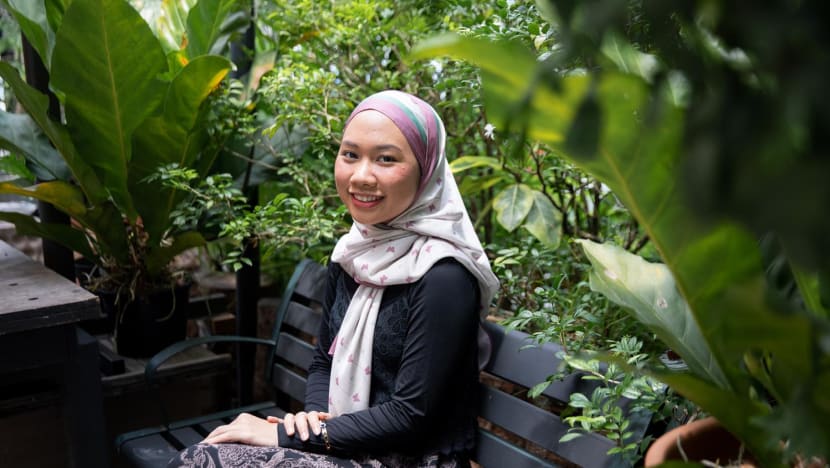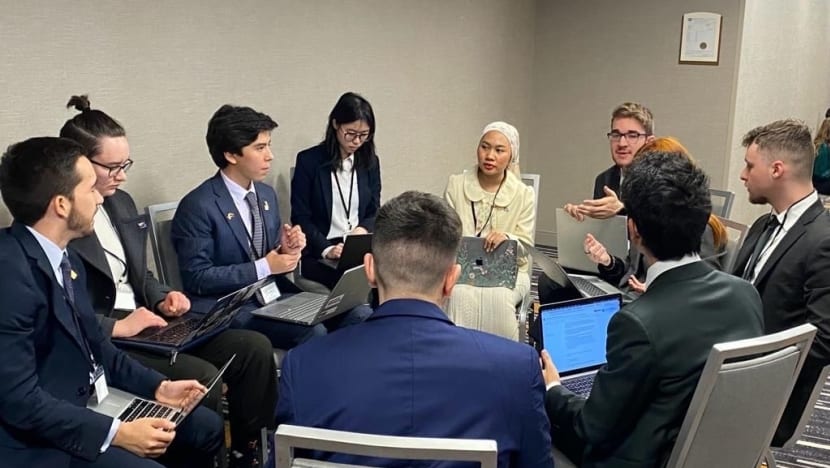Slaying Inflation: How an undergrad is self-funding her studies by saving creatively to still enjoy life

Undergraduate Syaqila Suzaini works several jobs to save up for her university fees.
SINGAPORE — It was a Saturday afternoon and Ms Syaqila Suzaini was just having her first meal of the day at 5pm, having been working non-stop since 8am.
For the 24-year-old undergraduate at the Singapore Institute of Management (SIM), this is what a typical weekend looks like — back-to-back tuition and part-time relief classes the entire day to pay for her university education.
As the final year undergraduate concludes her Bachelor of Science (Honours) in banking and finance in August next year, it is a race against time for her to save up the remaining S$12,000 in tuition and examination fees she needs to pay by January.
This, coupled with the rising costs of living, has added to the pressure of saving up enough for her studies.
Yet, when she shared her savings plan with TODAY, she appeared positive and determined that she would be able to save up the required amount in time.
Her secret? “I am always working,” Ms Syaqila said with a laugh.
As her parents believe that she is an adult and should work for her own money, she does not receive any allowance from them. She has been working since 2016 when she began her tertiary education in Nanyang Polytechnic to fund her studies and daily expenses.
Her mother, who is in her mid-40s and her father, who is in his mid-50s, are both middle-income earners. They support her in other ways, such as covering her food and transport expenses when they go out as a family.
She has two sisters who are working full time and studying part time, while her brother, the youngest in the family, is in secondary school.
When she is not studying or spending time with her family and friends, Ms Syaqila devotes the bulk of her time to providing tuition and relief teaching services, and taking up part-time jobs on an ad-hoc basis.
The key, she said, is also to be financially prudent and disciplined.
She shared with TODAY about how she has planned to save up money for her education.
TELL US ABOUT WHAT YOU HAVE TO SAVE UP FOR
I started my university education at SIM in 2019, with a major in economics and finance. I was supposed to complete my degree in three years, with a zero-interest study loan from Mendaki, a self-help group for the Malay/Muslim community, that covered 75 per cent of my tuition fees.
However, I decided to change my major to banking and finance in my third year, which resulted in my studies being extended for two years, until next year.
I believed that I should be responsible for my own decisions and bear the cost of the extended two years of university education myself, at about S$12,000 per academic year.
Mendaki was kind enough to offer me an extension to pay the loan six months after I graduate.
Payment for tuition fees are collected at three different points within the academic year, so I have time to slowly save up for each payment, instead of paying a lump sum.
Besides these basic expenses, I am also active in my co-curricular club in university, Model United Nations (Model UN).
Model UN is a programme where students role-play diplomats representing member states of the United Nations, and organise simulator conferences at different countries every year.
Last year, Model UN was held in Boston, United States. I had to save up for travel, accommodation and spending costs, which amounted to S$3,000.

HOW ARE YOU SETTING ASIDE THE MONEY?
I work a lot of jobs which is my only way of getting money since I do not receive an allowance from my parents any more.
When I am not studying or spending time with my family, I busy myself with offering tuition services and doing part-time relief teaching jobs so that I can earn enough to pay for my studies.
Since I have been offering tuition in maths and science subjects since my polytechnic days, I have years of teaching experience and amassed a strong network that has helped me to get teaching jobs and opportunities.
I have also recently secured a job as an after-school tutor at Mendaki and a relief teacher under the Ministry of Education. In addition, I teach part-time religious classes on Sundays.
On top of these jobs, I offer home tuition on Saturdays, which typically runs back-to-back from 8am to 5pm.
I stick to a limited budget for my personal expenses since I do not buy expensive items for myself.
I also practise spending consciously, by making sure that I only buy what I need and within my means. For example, I buy most of my clothes from thrift stores since it suits my vintage fashion style, so that helps me to cut costs.
I also bought my educational necessities like my laptop using my own savings and the money I received from the Goods and Services Tax voucher scheme.
Other than that, I make sure to be disciplined and set aside some savings from all of my jobs.
IN WHAT OTHER WAYS HAVE YOU TRIED TO SAVE UP?
Last year, I managed to secure a full-time accounting role which gave me a substantial salary as a full-time employee.
It did ease some of my financial burden, but I quickly realised that the job was taking over too much of my life that I did not have time for my family, friends and co-curricular activity (CCA).
Though I had planned carefully so that my work and school schedules did not clash, holding down a full-time job while studying was very taxing on me.
As a result, I was always tired and I could not fully enjoy being in the company of family and friends, or devote energy to my CCA, and I had to cut down on the number of meet-ups with my friends.
The last straw for me was when my friends and relatives started pointing out that I looked exhausted and I had changed from being a bubbly and cheerful person, to someone who was very gloomy.
Though I appreciated the work and the opportunity, I decided to quit the job since it had negative consequences on my mental health, social life and relationships.
I am still working and open to opportunities, but I have learned that the job should add value to my life and improve my quality of life.
WHAT SACRIFICES HAVE YOU HAD TO MAKE?
I think I have not had to sacrifice any necessities, and I’m grateful to have my parents and sisters cover my food expenses when we go out.
But I have had to sacrifice some wants, like forgoing a specific hair conditioner that works for me when it runs out at a time when I am short on cash.
While I spend a substantial amount of time working, I still value spending time with my family and friends, and making time for them.
I do this by scheduling my work and classes around their free time. So for example, my mother and sister have their days off on Monday, so I make sure that I do not schedule work or class on Monday evenings.
I also try to meet my friends even with a tight wallet, by doing activities that do not require spending, like hanging out at each other’s homes and eating home cooked food, or cycling together.
Sometimes, I will have to ask my friends to reschedule or postpone our meet-ups since I do not have the budget to go out. I am lucky that my friends are also in the same boat, so they understand what I am going through and accommodate me.
I try to get around making sacrifices through other ways, too.
For instance, if I want to attend a concert but cannot afford it, I will take up an ad-hoc part-time job manning the cashier or food stalls within the concert venue so that I can attend for free, and even get paid for it.
This was how I managed to go to the recent Harry Styles concert in March this year, and watch the Guns N’ Roses concert and the football match between Liverpool and Crystal Palace last year.
HAS INFLATION AFFECTED YOU?
I definitely feel the pinch of rising costs and inflation. It’s actually very painful because I am paying for my own expenses, including food and transportation.
Even though my family pays for my food and transport when we go out on the weekends, I have to cover for my own transport costs for the rest of the week, from Mondays to Fridays.
I usually take public transport on the weekdays when I am going to school, to tuition centres, or when I am going home.
To alleviate the costs of transportation, I buy the monthly hybrid concession pass for public buses and trains every month.
Even then, the cost of the concession pass, which is S$90.50, is a lot for me.
Sometimes the pass expires when I am low on cash and cannot fork out a lump sum amount of S$90, so I top-up my ez-link card by cash, at about S$10 every week, which is a more bearable amount for me.
Alternatively, I use my family members’ extra adult ez-link cards, which are usually for emergencies.
WHAT HAVE YOU LEARNT FROM THIS SAVINGS JOURNEY?
When times are tough, it is important to go through it with having a lot of love for what you do.
Though I teach tuition classes because I need the money, I do love teaching.
When I love what I do, I do not dread having to work. And I am grateful that I have amazing students who are very easy to teach and very appreciative of my lessons.
Another important lesson is to manage my time well and be disciplined.
If I am not disciplined and I skip or reschedule classes on a whim, I will never be able to earn enough money and save up for my education.
I have also learned to manage my time well so I have time for everything that matters to me, which are teaching, school, and spending quality time with family and friends.
WHAT FINANCIAL LITERACY EXPERTS SAY
EARN AN INCOME AND INVEST YOUR MONEY
With the costs of living on the rise, aspiring and current students should not just focus on earning an income to save money, but to also grow that money to help defray increasing costs of education, according to OCBC Bank’s executive director of investment strategy, Mr Vasu Menon.
DBS Bank’s head of financial planning literacy, Ms Lorna Tan, said that the individual can grow their savings in endowment plans that can guarantee some returns.
Agreeing, Ms Jacquelyn Tan, UOB Bank’s head of group personal financial services, said that endowment plans often pay a cash benefit from the second policy year which can come in useful to fund tuition fees or living expenses.
Besides an endowment plan, students can also use low-risk savings accounts and fixed deposits to enjoy guaranteed growth of their money, Ms Tan added.
Mr Vasu added that beyond earning an income and investing, one should also be disciplined by minimising their spending and being prudent with how they spend their money.
“This requires being brutally honest and being prepared to make hard decisions to cut back on unnecessary expenses bearing in mind that you are doing this for the purpose of your studies, which should yield longer-term benefits. So saving while you are studying often means trading off expensive short-term pleasures for longer-term gains,” said Mr Vasu.
PLAN AND BUDGET IN DETAIL
Those who is saving up for their education should detail what they need to pay for, on top of their tuition fees and living expenses, said Ms Tan.
This includes study materials such as textbooks and laptops, food, transport and accommodation.
She added: “People may forget to include such additional expenses, which could be higher or lower depending on each student’s expenditure and lifestyle.”
She also said that the aspiring student should think twice about selecting an appropriate study programme locally or abroad, since overseas programmes may not always be better than local ones.
In addition, one can also choose to pursue further studies later on in life.
“If you are funding your education in Singapore, check if you can use your parents’ ordinary account under the Central Provident Fund. If you need to take a loan, do your research and shop around for study loan schemes from relevant educational institutions and banks,” said Ms Tan.
“Ultimately, students should prioritise needs over wants if they are financing their own education. Taking on a part-time job also goes a long way to help them build their wealth.”














